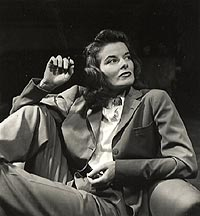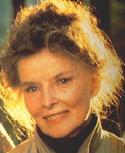Musings
an Online Journal of Sorts
By Alyce Wilson

One of the greats is gone. Hollywood icon Katharine Hepburn died yesterday at the age of 96.
In the words of David Sterritt, film critic for The Christian Science Monitor, interviewed last night on CNN, "It just seemed that she would just always be there."
Katharine Hepburn did seem immortal, and not just because she'd performed on stage and screen for more than 60 years, starting fresh out of Bryn Mawr college in 1928.
She appeared in her first film, Bill of Divorcement, in 1932 and completed her last, a TV movie called One Christmas, in 1994. Over her career, she performed in 44 films, received 12 Oscar nominations and won four Oscars, and was nominated for two Tonys.
But above and beyond that, her personality was so strong she seemed like a goddess on Earth. She an icon who was also an iconoclast, who stood firm by her standards in a day when Hollywood called all the shots. She negotiated her own contract at a time when studios strong-armed stars into thankless deals akin to being indentured servants.
And when the Hollywood Critics Association, after the tepid box office of Bringing Up Baby, took out a full-page ad declaring her box office poison, she fought back. First, she turned to Broadway, where she starred in The Philadelphia Story. When the play was closing its run, she decided not to let a good thing slip away, so she bought the movie rights and stipulated who would direct and star. And so we get the incredible classic film, starring Hepburn, Cary Grant and James Stewart.
Everybody is fascinated by her 27-year affair with costar Spencer Tracy. What fascinates them is that, being Catholic, he would never divorce his wife, and so the relationship took on a tragic quality, doomed to the sidelines. And yet, their passion for each other took center stage. In his declining years, she also sidelined her own career in order to care for him.
Their last film together, Guess Who's Coming to Dinner?, includes a remarkable speech by Tracy, where he talks about the power of love and then exchanges a tender but bittersweet glance with Hepburn. He died two weeks after the film completed, and she grieved by throwing herself into the deeply textured, poignant masterpiece, The Lion in Winter.
Her biographer, Barbara Leaming, believes that Hepburn's relationship with Tracy, like many of her other love relationships with people like director John Ford, was heavily influenced by the fact that she'd been the one to find her brother hanged after he committed suicide when he was 15 and she 13. Leaming says she blamed herself for not being able to prevent the tragedy and ever afterwards sought out relationships with men who needed nurturing, trying to save them.
Whether this psychological evaluation is true or not — and it seems it might be — in love, as in her career, Katharine Hepburn was never one to give up easily.
I first discovered Katharine Hepburn when my family used to watch old movies every Sunday afternoon on a local television station. They mostly played comedies like Abbott and Costello or the "Road" movies with Bob Hope and Bing Crosby, and every so often they'd treat us to a Katharine Hepburn film such as Bringing Up Baby, a terrific screwball comedy.
I absolutely loved her. She had a regal sort of quality, like a queen from Connecticut. And yet, there was something so endearingly genuine about her, regardless of the role. Whether it was a ditzy socialite as in Bringing Up Baby or a prim minister's sister as in African Queen, her acting was so invisible you could believe all these characters were her. Acting was more than a craft to her; she appeared to be living on screen.
 As
I grew older and found out more about her, about how she had regularly
worn pants and driven herself around Hollywood in a day when ladies wore
dresses and let men do the driving, and as she got older and resisted
the Hollywood ritual of mutilating your face with facelifts, and instead
aged naturally, gracefully and beautifully, I loved her even more.
As
I grew older and found out more about her, about how she had regularly
worn pants and driven herself around Hollywood in a day when ladies wore
dresses and let men do the driving, and as she got older and resisted
the Hollywood ritual of mutilating your face with facelifts, and instead
aged naturally, gracefully and beautifully, I loved her even more.
It all makes
sense when you find out more about her. Her mother and aunt were key in
the women's suffragist movement, fighting first for women's right to vote
and later, the right to birth control. Growing up in such a household,
it's not surprising
she had a self-confidence unequaled by her contemporaries.
So after this long, rich life, where she gave so much to both the movie loving public and to women, this Hollywood rebel, this dignified, educated, graceful queen, has passed on.
A friend of hers, James Prideaux, told CNN last night, "She viewed death as simply a long, lovely sleep." If so, she has certainly earned it, having left behind so many wonderful dreams for us all.
Moral:
"I never realized until lately that women were supposed to be
the inferior sex."
-
Katharine Hepburn
Copyright
2003 by Alyce Wilson
What
do you think? Share your thoughts
at Alyce's message board (left button):
![]()
![]()

